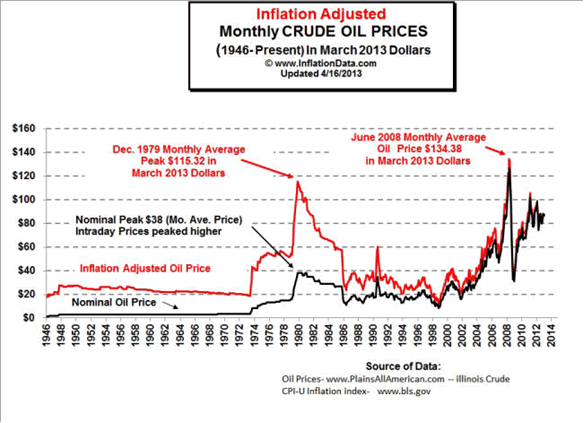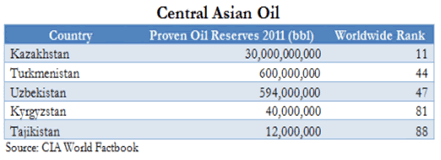Crude Oil Price Rides With The Asset Bubble - But Not Forever
Commodities / Crude Oil May 19, 2013 - 06:15 PM GMTBy: Andrew_McKillop
 BUBBLE TROUBLE
BUBBLE TROUBLE
Indicators as wide-ranging as real-versus-official inflation indexes, T-bond fundamentals against daytrade technicals and all major stock markets hitting the roof have a faithful tracker in the paper oil asset boom. For many, the orgy of central bank "easing" is a prime mover of this megatrend, and the attitude of central bankers can be gleaned by the comment, reported by Reuters May 13, from the head of Italy's central bank, Ignazio Visco, who is also a policymaker of the European Central Bank. Visco suggests that the ECB could cut its deposit rate below zero, effectively charging banks for parking any spare cash they do not lend. Although paper gold has now wilted, with plenty of help from market manipulators oil has temporarily, only temporarily gone the other way.
As the chart below shows, for 2008-2009, things can dramatically change in an eyeblink

First we can note that the oil price compression from the 1979 peak took 7 full years, to 1986, to fall by the same percentage amount it lost in only six months in 2008-2009. In nominal terms, we had a fall from over $125 a barrel for both WTI and Brent in June 2008, to just above $30 in February 2009, then a rebound to over $100 a barrel in April 2011.
PETRODOLLAR WAR
This is a longstanding theory, holding that a major driving force of US foreign policy is the status of the dollar as the world's dominant reserve currency - and the currency in which oil is priced. The term "petrodollar" was coined by William R. Clark. His theory, developed by many other authors and analysts is that because most major developed countries rely on oil imports, they are forced to hold large stockpiles of dollars in order to continue importing oil. This creates consistent demand for dollars, and prevents the dollar from losing its relative international monetary value, regardless of what happens to the US economy. Continuing with this more than 35-year-old theory, this also allows the US to issue bonds at lower interest rates than it would otherwise be able to. The now-outdated, we could say outclassed-by-reality theory also says that due to the petrodollar system, the US government can run higher budget and trade deficits for longer than almost any other country. This can be compared with Bank of Japan action and ECB action, as well as national budget deficits as a percentage of GDP in other developed countries, today.
Almost never considered by authors working the petrodollar warfare lode, notably concerning US relations with Iran, Venezuela and Russia, there are only two drivers for artificial dollar demand due to the petrodollar system. Firstly global oil import demand and the oil price have to hold up, and secondly, foreign nations who had formerly found it beneficial to hold dollars to pay for oil need to continue holding dollars even if their oil imports decline and-or oil prices decline. The "currency war" variant of the petrodollar system theory, holding that a shift to notably euros or gold for oil payments would undermine the system, is unrealistic when given any serious analysis.
Whenever these conditions change - oil prices down and declining oil imports by major countries - the dollars that are no longer needed will return, in massive amounts back to their country of origin, the USA. The consequences would be - or rather will be - dramatic.
CHANGE IS VENGEFUL
From the dawn of the petroleum age to its accelerating twilight, today, geopolitical strategies concocted by developed nations featured the maintenance of easy access to world oil supplies. This was conceived and believed to be a win-win strategy for developed nation policy makers, and especially for US policy makers. From the 1970s and the first Oil Shock of 1973-1974, the only "morph' in this policy and strategy was to substitute expensive oil, for cheap oil. For the USA's ability to run deficits and the Petrodollar System, much higher oil prices were a major gain, not a loss.
Previously, only the truly naive could deny the economic and political incentives for ensuring national access to cheap oil supplies, or could imagine that the petrodollar system as a monetary and finance tool, unrelated to the economy, works better with higher oil prices. Understanding the petrodollar system helps make sense of the hundreds of US military bases stationed in over 130 countries. Maintaining an empire depending on "dollars for oil" is no cheap task, but was maintained for as long as it was possible to believe, increasingly naively, that oil was only able to be produced outside the US, Canada, and other "friendly countries", and that new oil discoveries would be almost exclusively made in "anti-Western" countries always exercizing the threat of nationalizing oil reserves and supplies, and at least as important, scheming to challenge and replace the "petrodollar system".
The combined costs of the Afghan and Iraq wars for the US are of course controversial, like the interpretation of these wars as being "oil wars", but many analysts like Joseph Stiglitz and Linda Bilmes put the total cost at above $4 trillion. This can be compared with the annual cost of US oil imports - now declining on a year-in year-out basis as domestic shale oil output ramps up, and US oil demand stagnates.
The real role and size of "The Prize" in Central Asia can be appreciated from this CIA table:

To be sure, it is more than unlikely that politicians such as Barack Obama will stand up and admit that "the oil imperative" in the Middle East and Central Asia was exaggerated, or wrongly interpreted and is now outdated and irrelevant to US energy independence and emerging economic and socioeconomic realities in the US, as in other developed countries.
With the major and massive changes for oil resource availability revealed by the shale energy revolution, rising global oil production capabilities, stagnating oil demand in all major developed countries, and the declining role of oil in the economy, the Petrodollar System's days are numbered, like the notion that $100-oil prices are "normal". The impact of this will be massive.
By Andrew McKillop
Contact: xtran9@gmail.com
Former chief policy analyst, Division A Policy, DG XVII Energy, European Commission. Andrew McKillop Biographic Highlights
Co-author 'The Doomsday Machine', Palgrave Macmillan USA, 2012
Andrew McKillop has more than 30 years experience in the energy, economic and finance domains. Trained at London UK’s University College, he has had specially long experience of energy policy, project administration and the development and financing of alternate energy. This included his role of in-house Expert on Policy and Programming at the DG XVII-Energy of the European Commission, Director of Information of the OAPEC technology transfer subsidiary, AREC and researcher for UN agencies including the ILO.
© 2013 Copyright Andrew McKillop - All Rights Reserved Disclaimer: The above is a matter of opinion provided for general information purposes only and is not intended as investment advice. Information and analysis above are derived from sources and utilising methods believed to be reliable, but we cannot accept responsibility for any losses you may incur as a result of this analysis. Individuals should consult with their personal financial advisor.
Andrew McKillop Archive |
© 2005-2022 http://www.MarketOracle.co.uk - The Market Oracle is a FREE Daily Financial Markets Analysis & Forecasting online publication.



